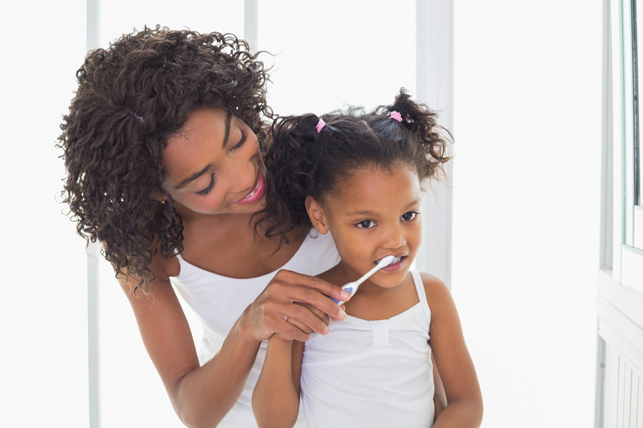
Caring for your child’s mouth is important for their current health and long term tooth development. Keeping a clean mouth helps prevent cavities, infection and gum disease, and it also creates a healthy smile as they get older. However, your child’s oral care routine – and toothbrush – should change as over time as well. Below are some tips to help you clean their mouth as they age.
Babies 1 – 12 months
A baby’s first tooth doesn’t typically erupt until they are 8 months old, but it’s still important to keep their mouth clean. You can clean their gums by taking a damp cloth or gauze and gently rubbing it over their gums to remove any food debris. You may choose to use a very soft, baby toothbrush and lightly brush their gums using a very low amount of pressure to avoid upsetting their sensitive gums. However, a damp cloth works just as well.
Toddlers 13 – 24 months
After the first tooth emerges – usually around the 8 month mark – begin to use a toddler’s toothbrush to clean their mouth. When shopping for a toothbrush, look for one that has rounded bristles and a small head that can easily fit into their mouth. Find a toothbrush that has very soft bristles, without the hard rubber liners on the outside of the head (called burs). You can begin flossing their teeth once they have two teeth touching. Use flat, wide floss and apply very gentle pressure to clean all sides of the tooth.
Preschoolers 2 – 4 years
By now, they will be walking, talking and eager for a bit of independence. They should have most of their teeth, and be familiar with brushing and flossing. Now is the time to start letting them have some input into their oral care routine. Take them with you to pick out their next toothbrush. Children love to be included in making decisions, and by giving them a little bit of responsibility, you empower them to make a decision. Make sure that the head of the toothbrush easily fits inside of their mouth, and that it has soft bristles. Since children lack developed dexterity, look for a toothbrush with a large handle to help them grip it more easily and continue assisting them as they brush. At this stage, you should also still be helping them floss and using the flat, wide dental floss.
School-aged Children 5 – 8 years
Your child is a tooth-brushing master, and the only thing they need to keep making progress is the right toothbrush. Help them pick a toothbrush that has a longer neck, and a larger head than their preschool toothbrush, but still fits comfortably inside their mouth. See if you can help them find a toothbrush with their favorite cartoon character or superhero to keep them engaged and entertained while they brush. If you think they are ready, you can begin to let them floss on their own, but under your supervision. As they approach 8 years of age, they should be ready to brush and floss by themselves.
Aim for Comfort and Consistency
It’s important to buy them a toothbrush that they are comfortable using. Monitor their mouths for any minor bleeding, and ask them about how it felt to use their new toothbrush for the first time. To establish the healthiest oral care routine, be sure that they are brushing twice per day for two minutes at a time. Try to only buy toothbrushes and tooth paste that has the ADA seal of approval, so that they are is getting the best product possible for their oral health.
Visit our office if you have any questions about brushing your child’s teeth, or buying them a toothbrush. We will work with you to help them establish a healthy brushing routine, and teach them about the lifelong benefits of a healthy mouth.
